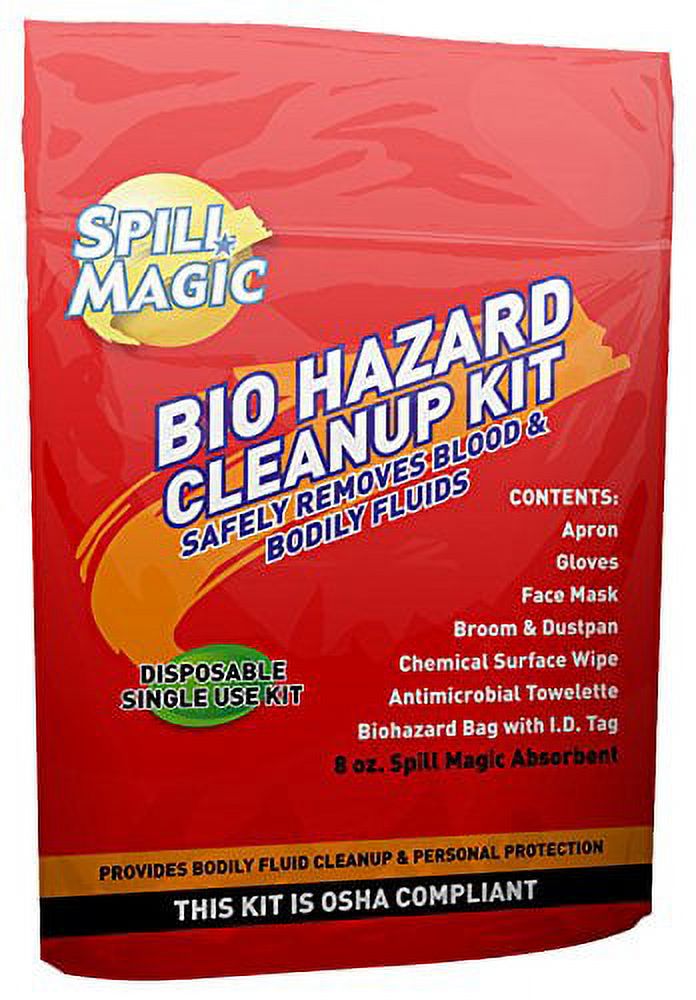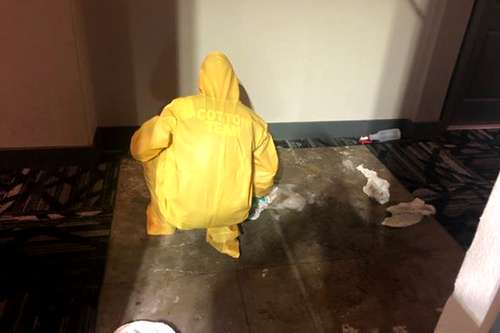Hoarder Cleanup Services: Mending Order and Safety in Your Home
Hoarder Cleanup Services: Mending Order and Safety in Your Home
Blog Article
Expert Biohazard Cleansing and Decontamination for Blood, Bodily Fluids, and Hazardous Products
The potential health risks associated with exposure to biohazards underscore the vital requirement for precise handling and extensive clean-up. As we browse the elaborate landscape of biohazard clean-up, comprehending the nuances of regulations, conformity, and the customized tools at play comes to be necessary in making certain a detailed and secure purification process.
Health Risks of Biohazard Direct Exposure
Direct exposure to biohazards presents significant health threats that can lead to severe effects for people and neighborhoods alike. Biohazards incorporate a wide variety of biological substances, consisting of blood, physical fluids, mold and mildew, microorganisms, viruses, and various other potentially infectious products. When individuals come right into contact with these biohazards, whether with mishaps, inappropriate handling, or environmental direct exposure, they deal with the threat of having significant ailments or diseases.
One of the key health and wellness threats related to biohazard direct exposure is the transmission of contagious conditions. Bloodborne microorganisms such as HIV, liver disease B and C, and various microorganisms can be present in biohazardous materials, posturing a direct hazard to human health. Breathing in air-borne biohazards like mold spores or entering into call with contaminated surface areas can also result in respiratory system issues, allergies, and various other adverse health and wellness results.
Furthermore, biohazard exposure can have lasting wellness effects, with some diseases materializing years after the preliminary call (Blood Cleanup). Therefore, it is vital to focus on proper biohazard cleaning and decontamination to alleviate these wellness risks and guarantee the security of people and areas

Specialized Training for Biohazard Clean-up
When it concerns dealing with biohazard cleanup efficiently and securely, specialized training plays a basic function in guaranteeing appropriate decontamination procedures are adhered to. Biohazard clean-up needs certain knowledge and skills to properly minimize dangers connected with bloodborne pathogens, bodily liquids, and unsafe products. Experts learnt biohazard cleanup undertake extensive direction on how to safely take care of, eliminate, and get rid of biohazardous products to avoid contamination and exposure.
Specialized training for biohazard cleaning covers a variety of important subjects, consisting of appropriate personal safety devices (PPE) usage, bloodborne virus understanding, decontamination methods, and contaminated materials disposal protocols. People educated in biohazard cleanup are equipped with the necessary know-how to examine contamination levels, recognize prospective hazards, and implement ideal clean-up procedures in conformity with regulatory criteria.
Continuous training and education and learning are paramount in the field of biohazard cleaning to stay updated on the most up to date decontamination modern technologies, safety procedures, and laws. By purchasing specialized training, biohazard clean-up specialists can effectively respond to emergency situation cleaning situations and secure both public wellness and the setting.
Significance of Appropriate Purification Strategies
Utilizing proper decontamination methods is crucial in biohazard cleanup to successfully lessen and remove unsafe materials health risks. Effective decontamination not only makes sure the elimination of noticeable traces of blood, physical liquids, and various other biohazards yet additionally targets unseen virus that may pose serious health risks if not appropriately gotten rid of. By adhering to rigorous decontamination protocols, trained specialists can significantly reduce the threat of direct exposure to dangerous microbes, infections, and germs that could cause infections or illness.
Proper purification methods entail using specific equipment and disinfectants that are especially created to reduce the effects of biohazards successfully. Comprehensive cleansing and disinfection of infected areas are essential to avoid the spread of microorganisms and ensure a risk-free atmosphere for residents. Additionally, the proper disposal of biohazardous waste complying with decontamination treatments is important in avoiding contamination of various other surfaces or people.

Devices and Tools for Safe Cleaning
When dealing with blood, physical liquids, or dangerous products, biohazard cleaning experts depend on specialized equipment to decrease exposure risks and thoroughly sanitize the damaged location. In addition, biohazard cleansing kits containing disinfectants, absorptive materials, and biohazard bags are made use of to safely have and dispose of infected products.
Advanced cleaning tools like hospital-grade disinfectants, HEPA-filtered vacuums, and fogging machines are utilized to disinfect surfaces and remove biohazards efficiently. Specialized equipment such as sharps containers and biohazard garbage disposal bins are made use of to safely manage sharp things and biohazardous waste materials. By using the appropriate tools and tools, biohazard cleaning specialists can make sure a detailed clean-up process that focuses on safety and lessens wellness risks for both employees and occupants of the damaged space.
Laws and Compliance in Biohazard Cleaning
Correct adherence to regulations and compliance standards is paramount in biohazard cleansing to ensure the security of both employees and the atmosphere. Government firms such as OSHA (Occupational Security and Health Management) and the EPA (Epa) have actually established details standards for biohazard cleanup treatments to minimize health risks and environmental contamination. These policies cover a series of facets consisting of the handling, transport, and disposal of biohazardous materials, along with the necessary training and safety equipment needed for employees entailed in the cleaning process.
Biohazard cleansing companies need to remain up-to-date with these policies to ensure that their operations satisfy the required security standards. Failure to adhere to these regulations can lead to serious effects, including penalties, legal action, and jeopardizing the health of individuals and the environment. By following rigorous regulations and compliance steps, biohazard cleaning business can successfully minimize dangers and make sure a extensive and risk-free cleanup procedure for all parties involved.
Conclusion
In verdict, biohazard cleansing and decontamination call for specific training, appropriate methods, and adherence to regulations. Direct exposure to blood, physical fluids, and hazardous materials presents substantial health threats, making it important to use the right equipment and tools for risk-free cleanup. By following rigorous procedures and standards, professionals can efficiently alleviate the risks related to biohazard exposure and make sure the safety and security of both themselves and others.
As we browse the detailed landscape of biohazard cleaning, recognizing the nuances of regulations, compliance, and the specific tools at play comes to be essential in making certain a extensive and secure decontamination process. (Blood Cleanup)
When it comes to dealing with biohazard clean-up efficiently and safely, specialized training plays an essential duty in making certain appropriate purification treatments are adhered to.Utilizing correct purification techniques is essential in biohazard cleanup to efficiently get rid of harmful materials and minimize health threats. Furthermore, biohazard cleansing packages having disinfectants, absorptive products, and biohazard bags are made use of to securely dispose and have of contaminated products.
Federal government companies such as OSHA (Occupational Safety And Security and ATP testing Health Administration) and the EPA (Environmental Defense Agency) have developed specific guidelines for biohazard clean-up procedures to lessen wellness risks and environmental contamination.
Report this page